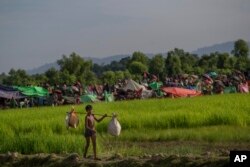The flow of Rohingya refugees fleeing Myanmar slowed to a trickle Tuesday as Bangladesh began screening the new arrivals, creating a bottleneck that left an estimated 15,000 stranded in a swollen creek with scant supplies, U.N. officials said.
Violence broke out against Rohingyas in Myanmar's northern Rakhine state following attacks on 30 police posts by Arakan Rohingya Solidarity Army militants on Aug. 25. An estimated 582,000 refugees — nearly 60 percent of them children — have since arrived in Bangladesh, according to the United Nations High Commission for Refugees, adding that a fresh exodus began Sunday night.
A UNHCR statement issued from Geneva said many refugees "had initially chosen to remain in their homes in Myanmar's northern Rakhine state despite repeated threats to leave or be killed." They finally fled when their villages were set on fire.
Human Rights Watch said Tuesday that newly released satellite images indicate at least 288 villages were partially or totally destroyed by fire in Rakhine state since Aug. 25. The Myanmar military has been accused of carrying out ethnic cleansing by using rape, killings, looting and the laying of landmines to prevent people from returning to their homes.
Drone shows refugees
Drone footage from UNHCR shows thousands of Rohingya lined up for kilometers in what appears to be a rain-swollen creek in southern Bangladesh. The agency expressed concern about the condition of those stranded near the border with little to no food, water and shelter. Some were already weakened after traveling by foot for up to a week.
"We are advocating with the Bangladesh authorities to urgently admit these refugees fleeing violence and increasingly difficult conditions back home. Every minute counts given the fragile condition they are arriving in," UNHCR spokesman Andrej Mahecic told reporters in Geneva.
"As of this morning, they are still squatting in the paddy fields of Anjuman Para village in Bangladesh," Mahecic said. "They are waiting for permission to move away from the border, where the sound of gunfire continues to be heard every night from the Myanmar side."
Mahecic said the delay was due to screening by Bangladesh border guards.
Lt. Col. Soe Myint Oo of Myanmar's Border Guard Police in Maungtaw in northern Rakhine state, told VOA Burmese there has been a steady exodus of Muslim residents from the region even though authorities tried to persuade them not to leave, pledging to provide basic staples and security.
Rohingya resident Hla Tun told VOA Burmese that Muslim residents remain unconvinced of authorities’ promises for better protection.
U.N. political chief visits Rakhine
Separately, U.N. political chief Jeffrey Feltman wrapped up a five-day visit to Myanmar, where he met with de facto leader Aung San Suu Kyi and Army Chief General Min Aung Hlaing, among others.
He reiterated the secretary-general's call that aid workers be given full and unimpeded access to northern Rakhine State and that refugees be allowed voluntary, safe and dignified return to their place of origin.
A U.N. spokesperson said Feltman also visited northern Rakhine, where he "saw dozens of burned and destroyed villages by air, and visited several communities affected by the recent violence."
The spokesperson said that in his discussions with military leaders, Feltman stressed that successful counter-terrorism efforts do not rely exclusively on security measures and underscored the importance of accountability and non-discriminatory rule of law to help build trust among the communities in Rakhine.
Second U.N. official visits camps
The Rohingya are one of many ethnic minorities in the Buddhist-majority nation. They are considered to be economic migrants from Bangladesh and have been denied citizenship, even though most can show that their families have been in Myanmar for generations.
In neighboring Bangladesh, the head of the U.N.'s migration agency (IOM), William Swing, visited camps and met with officials. The government, IOM and other agencies are working to set up a new 3,000-acre camp to accommodate the rapidly arriving refugees.
Next week, the United Nations will host a pledging conference in Geneva, seeking $434 million to help more than a million Rohingya.
VOA's Bangla and Burmese Services contributed to this report.





